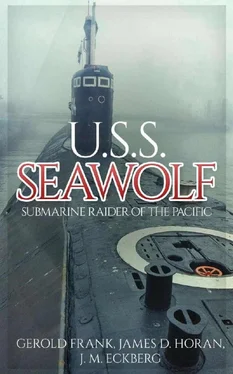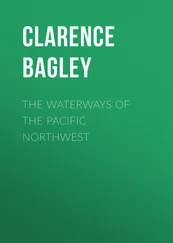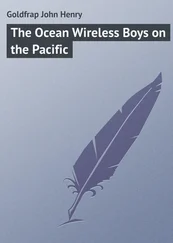Jim Riley, an old shipmate of mine, and I were celebrating our reunion that weekend, and Monday morning found us in the outskirts of Manila with big heads. We needed a lot of black coffee. We climbed into a cab and made for the Plaza Café.
Around the corner of the restaurant we could pick up a bus for Cavite, twelve miles away.
We sat down at the counter. The Filipino boy looked as though he was going to bawl. “Hell, boy, what’s the matter with you?” Jim demanded. He looked around. “What in hell is the matter with everybody? They’re jumping around like a bunch of jitterbugs.”
He was right. The place seemed to be seething with excitement.
The boy looked at us, startled. “You no hear Japs bomb Pearl Harbor?”
Pearl Harbor? U.S. soil? Jim and I stared at each other.
“You crazy?” I asked, turning to the Filipino. We glanced out the Plaza’s big plate-glass window. People were hurrying by.
And suddenly we felt the tension, too. We dashed outside. A cab screeched to a stop. The driver poked his head out. “Going to the docks, sailor?” he asked.
“You hear anything about a bombing?” I demanded.
“Sure,” said the driver. “You boys better wake up. I’ve been carrying Marines back to Cavite all morning.”
“Well, hell!” I said. “Let’s get going!” We piled into the cab. When we got to the dock everyone was rushing about. My heart leaped when I saw the Wolf . I caught a ship’s boat out to her. On the way I saw the aircraft tender Langley , her helmeted gun crews manning anti-aircraft guns on her flight deck. Most of the Wolf ’s crew was below when I finally got there. We were all a little punch drunk by the suddenness of it. Captain Warder, looking preoccupied, was already there. I was due topside for my watch, and I was pulling on my dungarees when Sousa walked through, his chin jutting out about an inch from where it should be.
“Come on, you guys, there’s a war on,” he growled. “Get moving!”
I climbed up the ladder fast. The air was mild, the sun shone.
War seemed impossible. Suddenly, in toward Manila, a light began blinking. It was our tender ship, the Canopus , signaling with her searchlight. She was about three miles away. I read the flashes, and with each word my blood pressure shot up.
“From… Commander Asiatic Fleet… To Asiatic Fleet… 080820… Urgent… Break… Japan… has… commenced… hostilities… Govern… yourselves… accordingly.”
There it was, officially. From Admiral Hart himself.
Frank Franz, one of the signalmen, was on the bridge answering the Canopus , but I wanted to give the message to the Skipper immediately. I ran to the conning tower and shouted down, “Below!”
“What do you want?” boomed back.
“Tell the Captain urgent message came in from the Admiral. Japan has commenced hostilities.”
The Canopus ’s searchlight was blinking again. All sub captains were to come aboard at once for a conference. The Skipper hurried off. Lieutenant Deragon’s high-pitched voice ran through the boat: “Preparations for getting under way.”
I kept the watch on deck. I thought: Those yellow sons of bitches. They’re going to rate everything I can give them. Why haven’t they shown up here? Those sons of bitches, those sons of bitches… and then a surge of rage so strong I felt myself tremble:
“What are we waiting for?”
I sensed the tension below. Everything depended on the orders Captain Warder brought back. Most of the men came up on deck.
We crowded the deck waiting for him. A few minutes after 9 a.m., a launch sped out toward us. The Skipper was in it. He carried a large white official-looking envelope in his hand, and I saw him limp slightly as he climbed over the rail. His knee was still bothering him. He turned to the coxswain who had helped him over. “Thank you,” he said quietly, and went below. The officers followed him. I trailed behind. “Willie,” I heard Captain Warder say, “what I want…” And then: “We’re going to take on more fish.”
A moment later Sousa boomed the order to load stores and ammunition. We set to work. Another launch roared up from the Canopus . She carried torpedoes. We rigged our booms. The huge warheads began to swing over. More launches raced out to us from the Canopus , loaded to the gunwales with dry stores and fresh provisions. A hand-to-hand brigade was set up on deck, and as boxes were hauled up we passed them along and down into the hatches. Launches scurried back and forth over the waters of the bay, their wakes crisscrossing each other, supplying torpedoes to the submarines, food for their men. The entire crew of the Wolf worked like beavers. We stocked up on milk, canned ham, canned chicken, sacks of beans, sacks of coffee, sacks of rice. We had no room for fresh vegetables now. We began throwing overboard cans of paint, bright-work polish, and useless tools—everything not essential to the business of war. The Wolf ’s spit-and-polish days were over.
We took lunch on the run—sandwiches, and coffee. Gus Wright, the cook, and our three Filipino messboys were all over the boat. As I stopped for a moment topside to gulp down my coffee, I could see Cavite’s three giant radio towers piercing the blue sky. How long would they be standing there, I wondered? What messages were going out from them to the world right now? Just after lunch an oil lighter drew alongside. We loaded to capacity with fuel. Supper came at 7 p.m. Thick steak, french fried potatoes, asparagus, and ice cream. The crew was almost light-hearted now. “Let’s get going!” you’d hear, and then a burst of swearing, and someone saying, “What are we waiting for? Time’s awastin’, ducks on the pond, let’s be away!”
Thirty minutes later we were called to quarters. The skipper had a message for us. We lined up. Captain Warder, not much older than many of us, looked us over quietly. The smallest vestige of a smile was on his lips, but it was a grim smile. It was as though he were saying to us, without putting it into words, “Well, boys, here it is. You and I are going to be damn busy. It’s serious as hell because it’s war, but we’re ready for it. We’re the Seawolf and now we really begin the job we got to do.”
What he said, was: “Men, we’re leaving here tonight. We are escorting a convoy made up of the Langley, the oil tanker Pecos, and the U.S.S. Black Hawk . The Sculpin and the Seawolf will escort these ships south.”
He paused. His left hand closed and opened and closed and opened again at his side—a habit of his when he was deeply moved. “Needless to say, you all know we’re not playing any more. We’re out after them now. Let’s get them.”
The Wolf left Manila at 10 p.m. The words on Captain Warder’s orders were clear and precise: “ You will sink or destroy enemy shipping wherever encountered.”
We had no chance to cable our families that we were all right. We’d have to wait for that later—somewhere, somehow. We knew we had our work cut out. Philippine waters are dangerous for submarines. Coral reefs, treacherous rocks, shoals, and in many places little depth to maneuver in, all add up to trouble. And the waters themselves are so clear that planes can easily spot submarines. We moved swiftly, but carefully, through the mine fields in Manila Bay, and then opened up to the best speed the surface ships could maintain. We were constantly on the alert. The night lookouts kept their eyes glued to their binoculars. Any moment we expected a wave of Jap bombers overhead. We strained every sense watching and listening for Jap submarines. We knew they must be racing toward us. News bulletins sputtered over the radio. The Japs had bombed Davao on the island of Mindanao. They had bombed Zamboanga on the southern tip of the Philippines. They’d landed on the north coast of Luzon. They’d bombed the important airfield at Aparri, 250 miles from Manila on the northeast tip of Luzon. They’d seized the International Settlement in Shanghai, bombed Hong Kong and even Singapore. Huge invasion forces had been sighted headed for the Philippines. Don Bell, the Manila news commentator, an honest, straight-from-the-shoulder broadcaster, was on the air without rest, giving additional details of the bombing of Pearl. And after Pearl, Cavite was their logical target…. But we saw the surface ships safely through the narrow and dangerous Verde Island passage south of Corregidor, and left them at dawn the next morning. As the sun rose on the ninth of December, we made our first day-long dive. We were on our first mission of the war; and from now on, unless we found ourselves in the safety of our own ports, the Wolf would never show more than her periscope in daylight.
Читать дальше






![Hubert Bancroft - The Native Races [of the Pacific states], Volume 5, Primitive History](/books/749157/hubert-bancroft-the-native-races-of-the-pacific-s-thumb.webp)

![Hubert Bancroft - The Native Races [of the Pacific states], Volume 1, Wild Tribes](/books/750126/hubert-bancroft-the-native-races-of-the-pacific-s-thumb.webp)



![Edward Ellis - Adrift on the Pacific - A Boys [sic] Story of the Sea and its Perils](/books/753342/edward-ellis-adrift-on-the-pacific-a-boys-sic-s-thumb.webp)